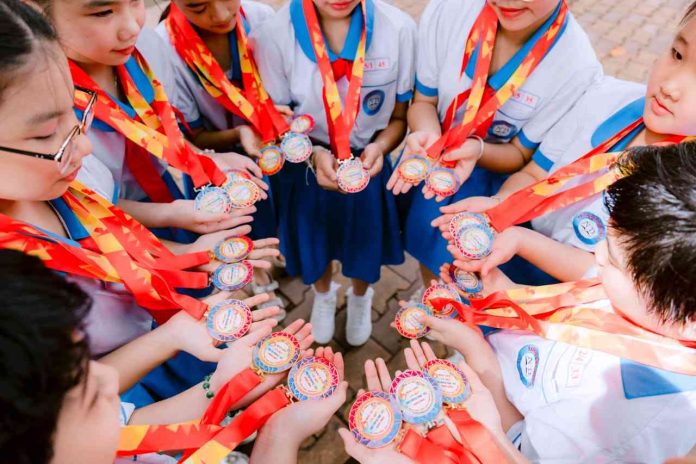Rewarding effort, development, and respect with clear and compassionate comments motivates youngsters in sports. Supportive acknowledgment boosts confidence reduces fear of errors and focuses on growth throughout practices and games. Consistent praise for correct technique, smart decisions, and teamwork helps athletes repeat useful actions until they become reliable habits that support safe and skillful play. Calm, specific encouragement also protects mental well-being, reduces tension, and turns training time into a stable space for learning. Strong, positive messages guide behavior, improve focus, and keep energy directed toward the next good action.
Builds Confident Skill Development
Positive reinforcement strengthens skill learning because clear feedback highlights the action that worked and invites the child to repeat it with attention and care. Coaches use simple language that names the movement, body position, or decision, which makes practice efficient and turns large tasks into smaller steps that feel possible and safe. Regular recognition of small gains keeps attention on form, timing, and balance, and it prevents frustration from slowing progress or causing needless doubt about ability. Athletic confidence grows when players show progress in exercises and controlled play. Praise for effort, attention, and cautious risk-taking builds confidence in youngsters, so concentrate on controlled actions rather than luck or others. Early reinforcement of proper conduct helps the brain associate reward with behavior and remember the pattern. Clear reinforcement reduces overcorrection, since helpful cues guide the next attempt without harsh tones that distract or discourage. Steady, respectful feedback builds trust and keeps learning moving at a healthy pace, which supports long-term growth across the season.
Supports Healthy Motivation and Consistency
Positive reinforcement supports steady motivation by linking practice with a sense of progress that feels real and measurable over time. Children understand that effort creates change when feedback points to a specific action and explains why it improved their technique or supported the plan for the group. This connection reduces the need for pressure or fear. It builds an internal drive that lasts beyond one session or one event, which protects attendance, punctuality, and honest focus during busy weeks. Consistency improves when children enjoy practice and feel safe to tackle hard tasks, so reinforcement arrives often enough to confirm growth without losing meaning. Balanced praise acknowledges both success and persistence after setbacks, which teaches patience and keeps emotions stable during competitive periods. Clear goals and simple tracking notes pair well with positive feedback because they show progress in easy numbers and short phrases, supporting habits that carry into school, home, and community life. Motivation stays stable when recognition treats improvement as a daily process rather than a rare reward.
Encourages Respectful Team Culture
Positive reinforcement models calm voices, fair standards, and respect among players, coaches, and families, shaping team culture. Cooperation, communication, and sportsmanship are rewarded for keeping sessions safe and structured, while private corrections safeguard dignity and avoid shame that would drive kids away. Predictable encouragement fosters trust, decreases disagreement, and empowers quieter athletes. Simple praise during workouts keeps players motivated and interested without pressure. When reinforcement values every function, defenders, scorers, and goalkeepers get recognition for their contributions to team strength. Children support teammates by copying adults’ straightforward, positive language, which develops respect and decreases blaming and mocking. A friendly atmosphere lets kids express questions, share ideas, and engage without fear of failure. Comfort reduces tension, improves attention, and accelerates learning during practice and sports. Positive interactions improve peer connections, making collaboration pleasurable and easy. These methods establish an encouraging atmosphere where every player is responsible for keeping the group happy and motivated. Boosting effort in every position fosters pride and encourages collaboration above individual success.
Protects Mental Health and Reduces Anxiety
Positive reinforcement minimizes anxiety by holding effort and learning above faults and speed. Children enter practice with calm minds when adults notice progress and guide corrections kindly. This climate reduces muscle tension, improves focus, and keeps breathing steady, which supports coordination and reaction time during fast moments on the field. Steady encouragement also helps new athletes settle into routines without pressure or confusion, which protects early participation. Mental health benefits grow over time because positive feedback teaches coping skills, patience, and self-talk that supports resilience during challenging stretches. Children learn to treat mistakes as information, then return to the task with a short cue rather than rumination or blame. Balanced praise guards against perfectionism, since messages highlight growth instead of constant comparison. Healthy minds recover faster after setbacks, follow instructions more clearly, and stay engaged with practice plans across long schedules.
Promotes Program Growth, Safety, and Participation
Make sports a place where kids feel capable, respected, and accepted to promote long-term participation. When progress is acknowledged, athletes enjoy sessions and stay active year-round, building fitness, camaraderie, and habit. As older athletes naturally model good behavior for younger groups, retention helps programs retain continuity, minimizes recruitment stress, and enhances leadership. Positive environments inspire families to support team activities and celebrate achievements with custom medals that recognize effort and build lasting motivation. Safe and entertaining activities enable youngsters to bring friends, increasing program numbers without effort. Safety increases because reinforcement emphasizes joint and muscle-protecting techniques, warmups, and cooldowns. When adults praise safe form and smart decisions, children repeat those actions under pressure, which prevents risky movements and lowers injury rates. Clear messages about hydration, rest, and equipment care gain power when framed as positive choices that keep bodies ready for learning and fair play. Good habits take root when safety receives the same warm, specific recognition as skill and effort.
Conclusion
Child sports benefit from positive reinforcement that grows skills, motivates, and protects mental health via controlled action feedback. Parents who emphasize collaboration and effort, and children who acquire safety, learning, and long-term engagement build stable cultures. Encouraging words turn practice into a place for progress rather than fear, so athletes stay present, tackle hard tasks, and bounce back after mistakes with calm, clear minds. Kind instruction, fair standards, and steady praise create a foundation that supports growth, enjoyment, and lasting involvement in sport.













